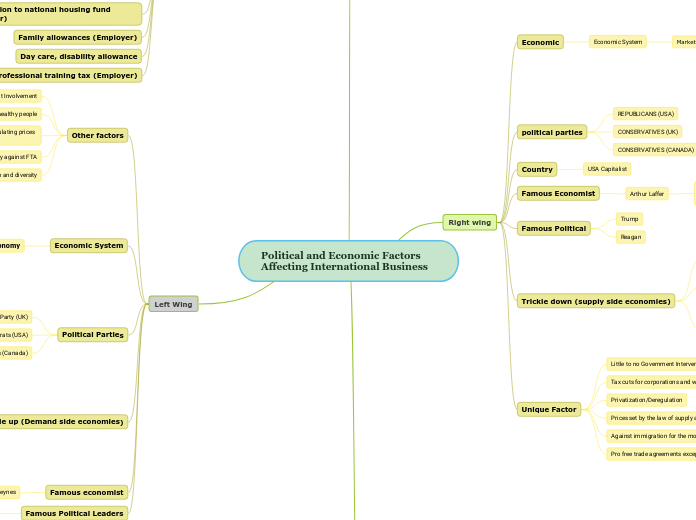Political and Economic Factors Affecting International Business
Right wing
Economic
Economic System
Market Economy
Governments have little direct business intervention
Prices depend on supply and demand law prices
encourages firms to launch new goods that are much better
Private ownership is promoted (including business)
Global investments are promoted, however self sufficiency is not an economic priority
Competition is a healthy and important factor in the development of quality and lower prices.
political parties
REPUBLICANS (USA)
CONSERVATIVES (UK)
CONSERVATIVES (CANADA)
Country
USA Capitalist
Famous Economist
Arthur Laffer
An American economist and a member of Reagan's Advisory Committee on Economic Policy. In addition, in the 2016 Trump presidential race, he was an economic adviser.
Famous Political
Trump
Reagan
Trickle down (supply side economies)
The argument that supply creates its own demand
Supply-side economics is an economic theory that postulates tax cuts for the wealthy result in increased savings and investment capacity for them that trickle down to the overall economy
President Reagan and his Republican contemporaries popularised the idea that larger tax cuts are creating incentives for wealthy investors and entrepreneurs to save, invest and deliver economic advantages that trickle into an economy as a whole.
Unique Factor
Little to no Government Intervention
Tax cuts for corporations and wealthy people
Privatization/Deregulation
Prices set by the law of supply and demand
Against immigration for the most part
Pro free trade agreements except for far right
Social security contributions levied on employers
Unemployment insurance benefits and supplements (Employer)
Accident and injury insurance (Employer)
Old-age, disability and survivors' pensions (Both employer and employee)
Financing of workers union (Employer)
Medical insurance - Reimbursements for medical and hospital expenses or provision of hospital or medical services - including maternity leave (Employer)
Contribution to national housing fund (Employer)
Family allowances (Employer)
Day care, disability allowance
Professional training tax (Employer)
Left Wing
Other factors
More Government Involvement
More taxes in Corporations and wealthy people
more government intervention when it come to regulating prices and owning subsidies
Mostly against FTA
For immigration, inclusion and diversity
Economic System
Command Economy
The government regulates the amount, distribution, and price of goods and services
The government restricts and controls private land ownership
The motive for profit is not the main purpose of the business, as government control is increased
The needs of the whole of society are seen as more important than the needs of the individual
The state takes decisions on price and wage regulations, production quotas and raw material distribution
Political Parties
Labour Party (UK)
Democrats (USA)
New Democrats (Canada)
Trickle up (Demand side economies)
Demand-side economics refer to Keynesian economists' belief that demand for goods and services drive economic activity
A important aspect of economic demand is aggregate demand
Putting more money in the pockets of the middle and lower classes has a greater benefit to the economy than saving or stockpiling the money in a wealthy person's account. (Taxing corporations and the rich instead of the middle and lower classes)
Government can generate demand for goods and services if people and businesses are unable to
Famous economist
John Keynes
An English economist with theories that have transformed macroeconomic practise and policies completely
Famous Political Leaders
Barak Obama
Center Wing
Political Parties
Liberals (CANADA)
MoDem (France)
Liberal Democrats (UK)
Economic System
Mixed Economy
The majority of major industries in socialist mixed economies are government-controlled
Mixed economies merge government engagement with business private ownership
Mixed economies have aspects of both market and centrally planned economic systems
